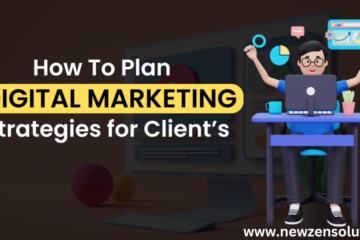In today’s digital age, content marketing has become an essential strategy for businesses of all sizes. It’s not just about creating content for the sake of it; it’s about creating valuable, relevant, and consistent content to attract and engage a specific target audience. If you’re still unsure about what content marketing is and why it should matter to your business, this article will break it down for you.
Content marketing is more than just writing blogs or sharing videos. It’s a holistic strategy that integrates with your overall business objectives, helping you build brand awareness, foster customer loyalty, and ultimately, drive revenue growth. In this comprehensive guide, we’ll delve deep into what content marketing is, its importance, and how you can use it effectively for your business
What is the future of digital marketing in 2024
What is Content Marketing?
Content marketing is a strategic marketing approach that revolves around creating and distributing valuable, relevant, and consistent content to attract, engage, and retain a clearly defined audience. The goal is to drive profitable customer action. Instead of focusing on direct promotion, content marketing educates, informs, and entertains your target audience, ultimately helping them make informed decisions.
In essence, content marketing isn’t just about creating content for content’s sake. It’s about creating a relationship with your audience through useful, engaging, and informative material.
Example: A company like HubSpot generates traffic to its website through its extensive library of blog posts, ebooks, and webinars, all aimed at educating business professionals on marketing, sales, and customer service.
Why is Content Marketing Important?
Content marketing is a cornerstone of modern digital marketing strategies. Let’s explore why it’s so important for business success:
Builds Brand Awareness
One of the key advantages of content marketing is its ability to build brand awareness. By creating content that speaks to the needs and interests of your target audience, you increase your visibility and create a positive association with your brand.
Example: A tech startup publishing blog posts about innovations in the industry builds trust and increases visibility, even if the audience is not ready to purchase just yet.
Drives Customer Engagement
Content marketing is an excellent tool for fostering engagement with your audience. Through blog posts, social media, or interactive content like quizzes and polls, you can create two-way conversations that strengthen your relationship with potential customers.
Tip: Use compelling calls to action (CTAs) to encourage readers to interact with your content, such as commenting, sharing, or downloading related resources.
Improves SEO and Organic Traffic
Search engines, particularly Google, reward high-quality content that is optimized for relevant keywords. By creating content that is both useful and SEO-friendly, you can improve your chances of ranking higher in search engine results pages (SERPs), thus driving organic traffic to your site.
Tip: Focus on long-tail keywords and create in-depth content that answers common questions in your niche.
Generates Leads and Increases Conversions
By offering valuable content, you not only educate your audience but also create opportunities for lead generation. Through lead magnets like eBooks, whitepapers, or webinars, you can capture email addresses and other valuable customer information that can be used for future marketing campaigns.
Example: A SaaS company might offer a free trial or a downloadable guide in exchange for an email address, effectively building its email list and nurturing leads.
Establishes Authority and Trust
Regularly producing insightful and well-researched content helps position your brand as an industry authority. Over time, this content builds trust with your audience, making them more likely to choose your products or services over your competitors.
Example: Thought leaders in fields like finance or health often build their reputations through consistent content marketing, creating authority and trust with their audience.
Key Types of Content Marketing
Content marketing is not limited to one medium. Several types of content can be leveraged to engage your audience:
Blogging
Blogging is one of the most popular forms of content marketing. By writing informative and engaging blog posts, businesses can improve their SEO rankings and educate their audience about relevant topics.
Tip: Keep blog posts at least 1,000 words to improve SEO chances and provide more value to your audience.
Video Marketing
Video is one of the most engaging forms of content, and it has proven to increase conversion rates and customer engagement. Platforms like YouTube and Vimeo allow businesses to share educational videos, tutorials, product demos, and behind-the-scenes content.
Example: Brands like GoPro use video marketing to showcase their products in action, which helps drive both brand awareness and conversions.
Infographics
Infographics are visual representations of information and are highly shareable. They can break down complex topics into digestible, easy-to-understand formats, which makes them perfect for content marketing.
Tip: Ensure your infographics are visually appealing, use statistics or facts, and align with your brand’s tone and style.
Podcasts
Podcasts have gained significant popularity in recent years. They provide an excellent opportunity for businesses to build authority, share thought leadership, and engage with their audience in a more personal way.
Example: Podcasts like “The Tim Ferriss Show” or “Marketing School” attract large audiences and help businesses expand their reach.
Social Media Content
Social media platforms like Facebook, Instagram, LinkedIn, and Twitter are integral to content marketing. By sharing content that resonates with your audience, you can build a loyal following and create brand awareness.
Tip: Tailor your content for each platform’s audience and format for maximum engagement.
How to Create an Effective Content Marketing Strategy
Set Clear Objectives
Before diving into content creation, set clear objectives for what you want to achieve. These objectives might include increasing traffic, generating leads, or improving brand awareness.
Tip: Use the SMART criteria to set goals—Specific, Measurable, Achievable, Relevant, and Time-bound.
Understand Your Audience
Knowing your audience is the first step in content creation. Create detailed buyer personas based on demographics, interests, pain points, and purchasing behavior. This will help you craft content that resonates with them.
Choose the Right Content Types
Based on your goals and audience, choose the right types of content. If your audience prefers visual content, focus on videos or infographics. If they consume information through reading, blog posts may be more effective.
Develop a Content Calendar
A content calendar helps you stay organized and ensures consistency. Plan out your content in advance and ensure it aligns with your business objectives and audience needs.
Measure Success and Optimize
Use analytics tools like Google Analytics and social media insights to track the performance of your content. If something isn’t working, adjust your approach.
Challenges in Content Marketing
While content marketing is powerful, it’s not without challenges. Common obstacles include:
- Creating Consistent Content: It can be difficult to maintain a steady flow of high-quality content.
- Measuring ROI: Content marketing often shows its benefits over time, making it hard to measure immediate returns.
- Staying Relevant: In a fast-paced digital world, staying relevant and up-to-date with content trends is crucial.
Content Marketing Best Practices
- Focus on Quality Over Quantity: High-quality, useful content always outperforms a high volume of irrelevant content.
- Optimize for SEO: Research and use the right keywords in your content to ensure it reaches the right audience.
- Repurpose Content: Repurpose blog posts into videos, infographics, or social media posts to maximize reach.
- Use Clear CTAs: Encourage action by including clear, compelling CTAs in your content.
Measuring Content Marketing Success
Key Performance Indicators (KPIs)
The success of your content marketing efforts can be tracked using the following KPIs:
- Website traffic and page views
- Lead generation and conversion rates
- Social media engagement (likes, shares, comments)
- Email open rates
- Customer retention and loyalty metrics
Conclusion
Content marketing is one of the most powerful tools in digital marketing today. By creating valuable, relevant, and consistent content, businesses can engage their audience, build brand loyalty, and drive long-term growth. It’s essential to have a clear strategy, understand your audience, and measure your success to continuously improve your efforts.
Call-to-Action: Is your business leveraging content marketing effectively? If not, it’s time to start. Explore how New Zen Solutions can help you craft a powerful content marketing strategy today.
How New Zen Solutions Can Help Your Business
New Zen Solutions can guide you in building and refining your content marketing strategy. Whether you need help with content creation, SEO optimization, or measuring success, our team is equipped to elevate your digital marketing efforts. Reach out today to explore how we can help your business grow.




